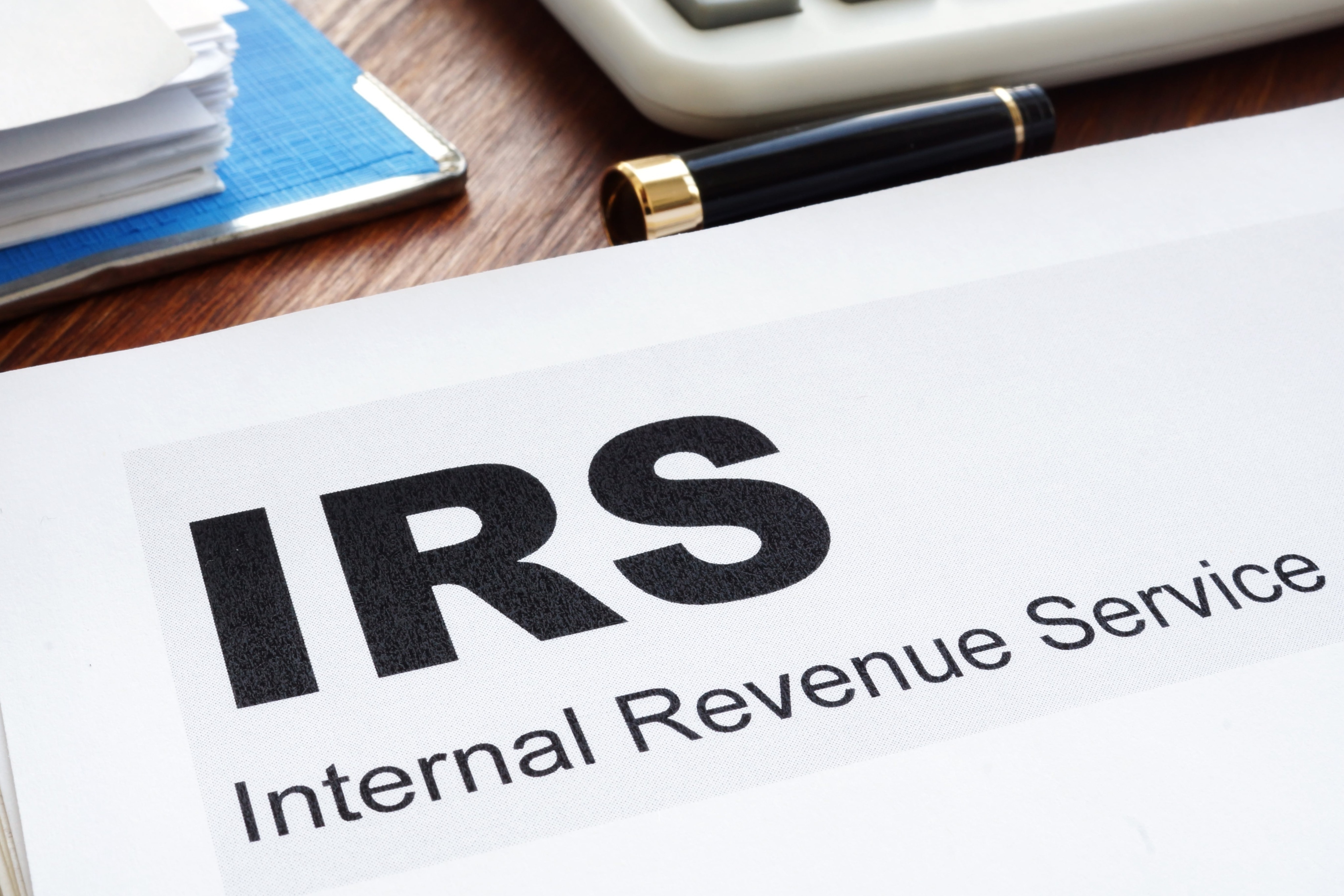What To Do If You Owe The IRS And Can't Pay
By Todd Whalen - July 9, 2021
What To Do If You Owe The IRS And Can't Pay
Owing a significant amount of money to the Internal Revenue Service (IRS) is frightening, especially if the amount owed is more than you can afford to pay.
Should you ever find yourself in that position, always consult with a qualified tax specialist before making any payments. You probably have more options than you realize.
Request an Installment Agreement
The most common way to deal with an outstanding balance owed to the IRS is to set up an installment agreement where you agree to pay the amount before a specified time.
The IRS offers a short-term installment agreement option for anyone owing less than $100,000. These agreements are typically for 120-180 days to pay a debt in full.
Anyone owing less than $50,000 may qualify for a long-term installment agreement that allows them to make monthly payments for a period longer than 120 days. These long-term agreements come with a reduced setup fee if you let the IRS automatically deduct the monthly payments from your bank account.
Qualify for an Offer in Compromise
Another option is what is known as an "offer in compromise." In these situations, the taxpayer offers an amount that is less than the total balance, and if it is approved, the IRS will forgive the remaining balance.
Unfortunately, there are rules and regulations to qualifying for an offer in compromise. The IRS will consider everything from your income and expenses to your current assets before letting you off the hook for a portion of the amount owed to them.
If you have an experienced tax professional on your side that understands the details of the process, this can be an excellent way to settle your debt to the IRS.
Other Options to Consider
Other options like the first-time penalty abatement program or requesting penalty relief through a reasonable cause can both reduce the amount owed.
Get together with a qualified tax specialist to go over your specific case, and you might be surprised to learn that there is more help available than you realize.
Recent Blogs
9 Tips Form
Help
Free Guide on 7 Ways to Fix Your Tax Problem
7 Ways to fix your tax problem
Unfiled returns
7 solutions
10% off any Transcript Purchase
Contact Us Now
Free Video
Business Special Offer
Big Special Offer!
Wouldn't you like to know where you stand with the IRS?
We can get you this information directly from the IRS at a very affordable price
- Not just how much do you owe, but things like
- Has the IRS filed returns for you?
- When will the debt expire?
- Has the collection statute expired already?
- Did the IRS place me as uncollectable (means they will leave you alone).
- Is the IRS poised to levy?
- What the heck is the IRS doing to me?
- What do I need to do to make this right?
- And YOU WILL GET A FREE MEETING WITH A PROFESSIONAL TO EXPLAIN IT ALL!!!
- $1,695 worth of services for a special price of $299.We've never offered this service for such a low price
Special Offer
Contact Us
Contact Us
John Boselli

John Boselli
John Boselli joined Advanced Tax Solutions in 2009. He serves as an assistant to the CPA’s and works on Tax Preparation & IRS Resolution Services. John has a Bachelor’s Degree in Liberal Arts from Bucknell University and a Master’ Degree in Business from Syracuse University. John is an avid fly-fisherman so you may see him on one of the many rivers he fishes in Colorado, Yellowstone Park, Montana, & Idaho.
Tax Resolution Associate
Glenn Robbins

Glenn Robbins
Glenn graduated from Regis University in 2005 with a Bachelor’s degree in Accounting. He is a CPA and has worked with Advanced Tax Solutions solely in IRS controversy since 2005. He is a member of the American Society of Tax Problem Solvers (ASTPS) and has received their highest professional recognition (Certified Tax Resolution Specialist). This certification is only given to those who have the experience, educational requirements, and proven competence in IRS negotiations.
- Certified Public Accountant – Licensed in Colorado to practice before the IRS
- Certified Tax Resolution Specialist – The CTRS is highest designation issued by the American Society of Tax Problem Solvers designating competency in dealing with the IRS
- Enrolled Agent - Licensed nationally to practice anywhere in the United States
- Member of the American Society of Tax Problem Solvers
- Member of the National Association of Enrolled Agents
- Member of Colorado Society of Enrolled Agents
Todd Whalen

Todd Whalen
Todd is the Founder of Advanced Tax Solutions. He is a Certified Public Accountant which allows him to represent clients in Colorado before the IRS. He is also an Enrolled Agent, which is a license that allows him to practice before the IRS anywhere in the nation. In addition, Todd has received the highest credentials offered by the National Association of Enrolled Agents (NAEA Fellow) as well as of the American Society of Tax Problem Solvers (Certified Tax Resolution Specialist). Todd solo hiked the entire 2,000+ mile Appalachian Trail. He loved to hike, fish and canoe.
(License Number: CPA.0012009)
- Founder of Advanced Tax Solutions
- Certified Public Accountant – Licensed in Colorado to practice before the IRS
- Enrolled Agent – Licensed nationally to practice anywhere in the United States
- Member of the American Society of Tax Problem Solvers
- Certified Tax Resolution Specialist – The CTRS is highest designation issued by the American Society of Tax Problem Solvers designating competency in dealing with the IRS
- Member of Colorado Society of Enrolled Agents
- NAEA Fellow – The “Fellow” is the highest designation of competency in dealing with the IRS that is issued by the National Association of Enrolled Agents.
- Member of National Association of Enrolled Agents
- Master of Taxation – University of Denver (DU)
- USTCP – Licensed before the Tax Court in all districts in the United States
Alex Petrosyan

Alex Petrosyan
Alex received a Bachelor’s degree in Accountancy from Colorado Technical University. He is a member of the American Society of Tax Problem Solvers (ASTPS) and has received their highest professional recognition (Certified Tax Resolution Specialist). He also received the National Association of Enrolled Agents’ highest recognition for working with IRS resolution cases (NAEA Fellow).
- Enrolled Agent— Licensed nationally to practice anywhere in the United States
- Member of the American Society of Tax Problem Solvers
- Certified Tax Resolution Specialist – The CTRS is highest designation issued by the American Society of Tax Problem Solvers designating competency in dealing with the IRS
- Member of the National Association of Enrolled Agents (NAEA)
- NAEA Fellow – The “Fellow” is the highest designation of competency in dealing with the IRS that is issued by the National Association of Enrolled Agents.
- Member of CO Society of Enrolled Agents
Michael Westerberg

Michael Westerberg
Mike Westerberg holds degrees in Sociology and Criminal Justice. He followed this up with a law degree from Phoenix School of Law. After graduating law school, Mike earned his Masters of Law in Taxation from the University of Denver. He has been working in tax resolution since 2014. Mike has earned the highest level of competence (Certified Tax Resolution Specialist—CTRS) from the American Society of Tax Problem Solvers.
- Licensed Attorney in Colorado & Arizona
- Masters of Law in Taxation - University of Denver (DU)
- Member of the United States Tax Court Bar
- Certified Tax Resolution Specialist –The CTRS is highest designation issued by the American Society of Tax Problem Solvers designating competency in dealing with the IRS
Charles Forsyth

Charles Forsyth
Charles graduated from Colorado State University with a concentration in Accounting. He is currently pursuing his Masters in Taxation at the University of Denver’s Sturm College of Law. Charles has received the American Society of Tax Problem Solutions highest Certification (Certified Tax Resolution Specialist). He also received the National Association of Enrolled Agents’ highest recognition for working with IRS resolution cases (NAEA Fellow). These certifications are only given to those who have the experience, educational requirements, and proven competence in IRS negotiations.
- Enrolled Agents — Licensed nationally to practice anywhere in the United States
- Member of the American Society of Tax Problem Solvers
- Certified Tax Resolution Specialist – The CTRS is highest designation issued by the American Society of Tax Problem Solvers designating competency in dealing with the IRS
- Member of National Association of Enrolled Agents (NAEA)
- NAEA Fellow – The “Fellow” is the highest designation of competency in dealing with the IRS that is issued by the National Association of Enrolled Agents.
- Member of the Colorado Society of Enrolled Agents
Susan R. Estes

Susan R. Estes
Susan has a strong background for over 15 years in bookkeeping, taxes and administrative assistance experience working with many Denver based businesses where she was responsible for full cycle bookkeeping, accounts payable, receivable, payroll, bank reconciliations, and inventory. Susan has a Bachelor’s Degree in Finance and graduated Magna Cum Laude.
Outside of work, Susan enjoys relaxing with her husband Rick and her two dogs, Maggie & Rocky. She is a professional photographer and enjoys shooting high school seniors, professional head shots, families, and Denver based bands.
Tax Resolution Associate
Jenna Boyce

Jenna Boyce
Jenna joined the Advanced Tax Solutions Team in July of 2018, starting as an Administrative Assistant to the Professionals. Now she is the Executive Assistant to the CEO, Todd Whalen. Out of the office Jenna enjoys spending time with her family and cheering for the Colorado Avalanche team.
Executive Assistant
Tabatha Clayburn

Tabatha Clayburn
Tabatha joined the Advanced Tax Solutions team in May of 2017 after working 15+ years in retail management. She enjoys working with people and brings that experience into the office setting. In her spare time she enjoys playing sports, especially softball. She also loves cheering for our Denver home teams. She always keeps herself busy by camping, traveling to Las Vegas and spending time with her family. Most of all, she loves to spend time with her grandchildren.
Office Manager
Barbara Rael

Barbara Rael
Barbara has brought over 35 years of Administrative Assistant experience to Advanced Tax Solutions from working in the financial industry. Barbara is confident and well-organized with extensive experience in scheduling appointments, providing exceptional customer service and consistent clerical support. She is a highly approachable individual who has a pleasant attitude and a willingness to make a positive mark. Barbara and her husband of 30 years are natives of Colorado. She enjoys spending time with their twin grandsons, camping, fishing and riding their horses.
Administrative Assistant
Venessa Kendall

Venessa Kendall
Venessa has over five years’ experience in the financial arena. She has worked as a bank teller and then as a financial wellness consultant. Her administrative skills keep the office running smoothly and allows the professionals to work on cases effectively and worry free. Vanessa is a true Colorado Native and enjoys Colorado’s beautiful scenery. She is an avid cook and her background even includes culinary school. She challenges herself in cooking diverse meals with engaging flavors.
Administrative Assistant
Neil Mitten

Neil Mitten
Neil joined Advanced Tax Solutions after a fulfilling career as a high school math teacher.After honing his interpersonal skill by working in a high school environment for 6 years, he decided to apply his math skills in the field of accounting. After working with high school students on a daily basis, dealing with IRS agents is a piece of cake.At Advanced Tax Solutions he assists in preparing tax returns and completing the IRS required financial information that is necessary when dealing with more difficult tax problems. Currently Neil is earning his Enrolled Agent certification, so he can be a front runner in difficult IRS situations.He has a bachelor’s degree in Economics from Loyola University Maryland.A recent transplant from Maryland, Neil is enjoying all that the beautiful nature of Colorado has to offer, particularly snowboarding and hiking.He is also an avid dancer of Lindy hop.
Tax Resolution Associate
Beth Ellis

Beth Ellis
Tax Resolution Specialist
Enrolled Agent - Licensed nationally to practice anywhere in the United States
Certified Tax Resolution Specialist – The CTRS is highest designation issued by the American Society of Tax Problem Solvers Designating competency in dealing with the IRS
Member of American Society of Tax Problem Solvers
Member of Nation Association of Enrolled Agents (NAEA)
NAEA Fellow – the “Fellow” is the highest designation of competency in dealing with the IRS that is issued by the Nation Association of Enrolled Agents
Member of CO Society of Enrolled Agents
Beth Ellis is a Senior Tax Associate and an Enrolled Agent. She has been working in the Tax Industry for over 16 years. Beth brings her tremendous negotiating skills and keen sense of problem solving to our most difficult cases. She is a Certified Tax Resolution Specialist with ASTPS and a long-standing member of the NATP and Colorado Society of Enrolled Agents.
Anisha Khadka

Anisha Khadka
Anisha Khadka is a graduate of Columbia College. She is an Enrolled Agent and a Certified Tax Resolution Specialist, assisting CPAs and EAs at ATS with both business and personal tax preparation, as well as IRS resolution cases. In her free time, she enjoys traveling to new destinations and spending time in nature.
Enrolled Agent – Licensed nationally to practice anywhere in the United States
Certified Tax Resolution Specialist The CTRS is highest designation issued by the American Society of Tax Problem Solvers designating competency in dealing with the IRS
Monica Pockrus

Monica Pockrus
Certified Tax Resolution Specialist
Monica received an MBA in Professional Accounting from CSU Global. She became a recognized Enrolled Agent in January of 2024. She is also a member of the American Society of Tax Problem Solvers and has earned her certification as a Certified Tax Resolution Specialist. Prior to working at Advanced Tax Solutions, she was a tax examiner for the Colorado Department of Revenue for 6 years. Outside of work her children and grandchildren are her priority and the joy of her life.
Enrolled Agent – Licensed nationally to practice anywhere in the United States
Certified Tax Resolution Specialist The CTRS is highest designation issued by the American Society of Tax Problem Solvers designating competency in dealing with the IRS
Tracy Port

Tracy Port
Enrolled Agent - Licensed nationally to practice anywhere in the United States
Member of American Society of Tax Problem Solvers
Member of Nation Association of Enrolled Agents (NAEA)
NAEA Fellow – the “Fellow” is the highest designation of competency in dealing with the IRS that is issued by the Nation Association of Enrolled Agents
Member of CO Society of Enrolled Agents
Tracy joined Advanced Tax Solutions in 2022 as an Enrolled Agent and brings with her a background in Banking and Early Education. She has spent the last seven years of her career preparing Individual and Small Business Tax Returns. Tracy is passionate about her work and extremely detailed. Her knowledge as an Enrolled Agent continues to grow as she uses her skills and compassion to represent our clients before the IRS and State Revenue Departments. Tracy is a member of the American Society of Tax Problem Solvers and a proud member of the National Association of Enrolled Agents (NAEA). Tracy is the sixth generation of a long line of Coloradans born and raised here. Enjoys all the beauty and love for sports that Coloradans are known for. She volunteers for organizations such as There with Care, and The Caruso Family of Charities as her youngest daughter is a recent childhood cancer survivor. Tracy is a proud mother of a United States Marine and comes from a long line of Military family members. Tracy enjoys hiking, going to ball games, beautiful sunsets, and time with her family and friends.
Jamie Reyes

Jamie Reyes
Enrolled Agent - Licensed nationally to practice anywhere in the United States
Member of Nation Association of Enrolled Agents (NAEA)
Member of CO Society of Enrolled Agents
Jamie received his bachelor’s degree in Accounting and Finance from the Leeds School of Business at the University of Colorado Boulder in 2019. He has been working in tax resolution and tax preparation ever since and has made it his career goal to help as many individuals and businesses as possible get back on track and into compliance with all taxing authorities. He is a member of the Nation Association of Enrolled Agents and the American Society of Tax Problem Solvers. In his spare time, Jamie enjoys taking advantage of all the exciting activities that Colorado has to offer including skiing, mountain biking, backpacking, and experiencing live music with his partner and friends
Monet Alvarez

Monet Alvarez
Monet has been an Administrative Assistant with Advanced Tax Solutions since February 2021. Her ability to do exceptional work in customer service comes from her background in retail. Monet is originally from Colorado. She loves surrounding herself with her big family to cheer on Denver sport teams or attend concerts. Monets’ most cherished time is with her son.
Daniela Musgrave

Daniela Musgrave
Daniela joined Advanced Tax Solutions in July 2022. She has an A.A.S degree in Business Management. She enjoys helping people and enjoys doing crafts in her free time. She previously worked in health care and decided to take a break and go back to working in an office.
Jannine Sadler

Jannine Sadler
Certified Public Accountant - Licensed in Colorado to practice before the IRS
Jannine is a Certified Public Account in the state of Colorado and has a Master of Taxation from the University of Denver. She received a bachelor’s degree in Accounting from the California State University of Long Beach, and master’s degree in Management and Information systems from the Colorado University of Denver. She has practiced in the private sector and public accounting as both a controller and tax manager. Her experience has crossed various fields from professional services, oil and gas and real estate. (License Number CPA 11243)
